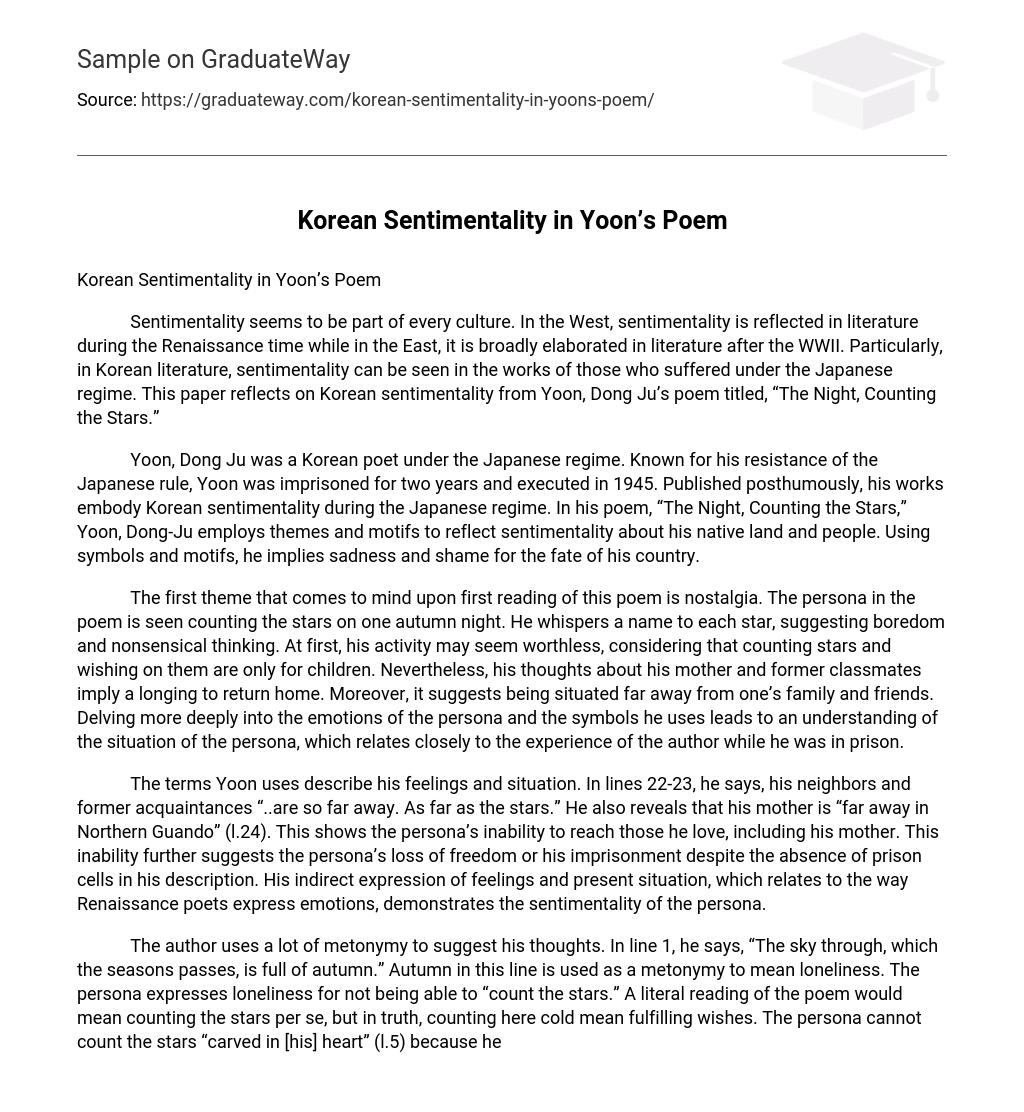Sentimentality seems to be part of every culture. In the West, sentimentality is reflected in literature during the Renaissance time while in the East, it is broadly elaborated in literature after the WWII. Particularly, in Korean literature, sentimentality can be seen in the works of those who suffered under the Japanese regime. This paper reflects on Korean sentimentality from Yoon, Dong Ju’s poem titled, “The Night, Counting the Stars.”
Yoon, Dong Ju was a Korean poet under the Japanese regime. Known for his resistance of the Japanese rule, Yoon was imprisoned for two years and executed in 1945. Published posthumously, his works embody Korean sentimentality during the Japanese regime. In his poem, “The Night, Counting the Stars,” Yoon, Dong-Ju employs themes and motifs to reflect sentimentality about his native land and people. Using symbols and motifs, he implies sadness and shame for the fate of his country.
The first theme that comes to mind upon first reading of this poem is nostalgia. The persona in the poem is seen counting the stars on one autumn night. He whispers a name to each star, suggesting boredom and nonsensical thinking. At first, his activity may seem worthless, considering that counting stars and wishing on them are only for children. Nevertheless, his thoughts about his mother and former classmates imply a longing to return home. Moreover, it suggests being situated far away from one’s family and friends. Delving more deeply into the emotions of the persona and the symbols he uses leads to an understanding of the situation of the persona, which relates closely to the experience of the author while he was in prison.
The terms Yoon uses describe his feelings and situation. In lines 22-23, he says, his neighbors and former acquaintances “..are so far away. As far as the stars.” He also reveals that his mother is “far away in Northern Guando” (l.24). This shows the persona’s inability to reach those he love, including his mother. This inability further suggests the persona’s loss of freedom or his imprisonment despite the absence of prison cells in his description. His indirect expression of feelings and present situation, which relates to the way Renaissance poets express emotions, demonstrates the sentimentality of the persona.
The author uses a lot of metonymy to suggest his thoughts. In line 1, he says, “The sky through, which the seasons passes, is full of autumn.” Autumn in this line is used as a metonymy to mean loneliness. The persona expresses loneliness for not being able to “count the stars.” A literal reading of the poem would mean counting the stars per se, but in truth, counting here cold mean fulfilling wishes. The persona cannot count the stars “carved in [his] heart” (l.5) because he has not fulfilled his wishes or his mission for each. He expresses looking forward to the future in the following lines:
“Because the morning is soon to arrive.
Because tomorrow night is yet to come.
Because my youth has not yet ended.” (l. 6-8)
In these lines, the persona uses the word morning to mean the future, tomorrow night to mean the present sorrow he feels, and his youth to mean his fruitful years. Metonymy is greatly employed in order to hide the real intention of the author.
The use of things in nature as symbols to represent his situation and emotions presents a deeper sense of sentimentality. The stars, sky, autumn, dust, and bug all serve as vehicles for the feelings of the persona. These symbols connectedly represent his loneliness and burden. The star and the skies suggest nostalgia and emptiness, autumn is for loneliness, while the dust and the buzzing bee are for shame and troublesomeness. The persona is lonely for being apart from his loved ones, specially his mother who could likewise mean his motherland. He is troubled for his country like when a bee buzzes in his ear throughout the night. The troubles he bears fill him with shame that is why he covers his name with dirt or dust. He realizes his inability to save his country from the enmity it suffers. Nevertheless, at the end of the poem, he expresses hope for his country to flourish despite its present situation. He does not elaborate what his land is experiencing but the thought of female classmates with “foreign names” (l.17) implies colonization. Likewise, the shame he bears further emphasizes the misfortune he witnesses in his land.
The thoughts that Yoon expresses toward his country show the deep sense of sentimentality Koreans have for their country especially during colonization by the Japanese. Using the theme of nostalgia, loneliness, shame and hope, the author emphasizes rootedness in one’s culture and love for his countrymen. The use of metonymy and symbolism to suggest imprisonment further reveal Korean sentimentality and creativity. Reading the poem surely moves one to feel compassion towards a country that once experienced censorship and colonization.
Reference
Yoon, Dong Ju. (n.d.) The night, counting the stars. In Name of Book. Place of Publication: Publisher, pages.





